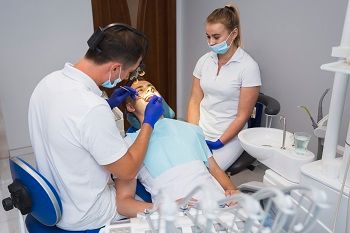Overcoming Fear: Dealing with Dental Anxiety During Full Jaw Restoration
Dental Implants Solutions
This blog post will explore a topic that strikes a chord with countless individuals: "Overcoming Fear: Dealing with Dental Anxiety During Full Jaw Restoration." We understand that dental anxiety is a formidable adversary that can threaten to hold you back from seeking the vital care you need. Full jaw restoration is a life-changing journey; we believe no one should face it with fear.
Understanding Dental Anxiety
Dental anxiety, a dental phobia or odontophobia, is a deeply ingrained fear or apprehension related to dental treatment and procedures. It's far more common than you might think, affecting people of all ages and backgrounds.
Causes of Dental Anxiety
- Past Traumatic Experiences: Many individuals who experience dental anxiety have had traumatic or painful dental experiences. These memories can create lasting emotional scars that make future dental visits terrifying.
- Fear of Pain: Pain fear is a significant driver of dental anxiety. Even the thought of needles, drills, or extractions can trigger intense fear and discomfort.
- Loss of Control: Being in a vulnerable position, reclined in a dental chair, and unable to see what's happening can lead to a feeling of loss of control, which can be unsettling for some.
- Needle Phobia: For some, it's not the dental procedure itself but the prospect of needles or injections that causes extreme anxiety.
- Anxiety Disorders: Individuals with generalized or other anxiety disorders may be more prone to dental anxiety.
- Embarrassment: Concerns about the appearance of one's teeth, breath, or the fear of judgment from the dentist can contribute to dental anxiety.

The Impact of Dental Anxiety on Oral Health
Dental anxiety is more than just a feeling of unease; it can have tangible and lasting consequences on oral health. Understanding how dental anxiety affects your mouth and overall well-being is crucial in recognizing the importance of addressing and overcoming this fear.
- Delayed Dental Care: Perhaps the most noticeable effect of dental anxiety is postponing or avoiding dental visits. Routine check-ups and preventive care are essential for maintaining good oral health. When dental anxiety causes you to skip these appointments, it can lead to undetected and untreated dental issues.
- Worsening Dental Problems: Dental problems rarely resolve independently; they tend to worsen over time. What might have been a minor cavity or gum issue can escalate into a more significant and painful problem, requiring more extensive treatment when left unaddressed.
- Increased Risk of Tooth Decay and Gum Disease: Skipping regular cleanings and check-ups can cause a buildup of plaque and tartar. These conditions can cause pain tooth loss and even impact your overall health.
- Compromised Oral Function: Dental anxiety can result in neglecting necessary dental procedures, such as fillings or root canals. As a result, you may experience pain, difficulty eating, and impaired oral function.
- Emotional Stress: Dental anxiety isn't limited to the dental chair; it can extend to your daily life, causing chronic stress and worry about your oral health. This ongoing stress can negatively affect your mental well-being.
- Poor Overall Health: Emerging research suggests a connection between oral and overall health. Untreated dental issues can contribute to or exacerbate systemic health problems like cardiovascular disease and diabetes.
Recognizing Your Dental Anxiety
Dental anxiety can be insidious, often lurking beneath the surface until it's time for a dental appointment. Recognizing that you have dental anxiety is a crucial step in addressing it. In this section, we'll explore some common signs and symptoms of dental anxiety to help you identify and acknowledge your fears.
- Intense Nervousness: If the thought of visiting the dentist fills you with extreme nervousness or dread, it's a strong indicator of dental anxiety. This feeling may start days or even weeks before your appointment.
- Avoidance Behavior: Do you frequently cancel or reschedule dental appointments? Avoidance behavior is a common response to dental anxiety. This avoidance can lead to delayed care and worsening oral health.
- Physical Symptoms: Dental anxiety can manifest physically, causing symptoms like sweating, trembling, rapid heartbeat, or an upset stomach when thinking about or entering a dental office.
- Negative Thoughts: Negative thoughts about dental procedures, such as imagining extreme pain or envisioning worst-case scenarios, are common among individuals with dental anxiety.
- Feeling on Edge in the Dental Chair: Even when you make it to the dental chair, you may still experience heightened anxiety. Restlessness, difficulty sitting still, or constantly gripping the chair are signs of this.
- Overreacting to Pain: Individuals with dental anxiety may have a heightened perception of pain during dental procedures, leading to overreacting or feeling more discomfort than the average person.
- Emotional Distress: Dental anxiety can extend beyond the dental office, causing emotional distress and preoccupation with upcoming appointments. You may feel anxious for days or weeks before the scheduled visit.
- Avoiding Dental Care Altogether: In extreme cases, dental anxiety can lead to avoiding dental care altogether, resulting in severe oral health issues.
Open Communication with Your Dentist: A Key to Overcoming Dental Anxiety
Establishing open and honest communication with your dentist is one of the most effective ways to tackle dental anxiety, especially when facing significant procedures like full jaw restoration. Dentists are not just oral health professionals but are also trained to understand and address patient concerns and fears.
Why Open Communication Matters
- Building Trust: Establishing trust is crucial in any patient-dentist relationship. Openly communicating your fears and concerns allows your dentist to understand your needs better and tailor their approach accordingly.
- Customized Treatment: Dental professionals can adapt their techniques and treatment plans to accommodate anxious patients. Sharing your anxieties enables your dentist to create a customized plan that suits your comfort level.
- Creating a Supportive Environment: Dental offices often offer amenities and techniques to help anxious patients relax, such as calming music, aromatherapy, or sedation options. Effective communication ensures these resources are available to you.
- Managing Expectations: Being transparent about your anxieties helps manage your expectations. Your dentist can tell each step of the procedure, which can demystify the process and alleviate fear of the unknown.
Tips for Effective Communication
- Schedule a Consultation: If you're apprehensive about a forthcoming dental procedure, consider scheduling a consultation with your dentist before the treatment. This lets you discuss your concerns and ask questions in a low-pressure environment.

- Write Down Your Concerns: Write down your fears and questions before your appointment. Having them in writing can help you express yourself more clearly during your discussion with the dentist.
- Be Honest: Honesty is key. Share the extent of your anxiety and any specific triggers or past negative experiences. The more your dentist knows, the better they can assist you.
- Discuss Sedation Options: If you believe sedation might help alleviate your anxiety, discuss this option with your dentist. They can explain the types of sedation available and their suitability for your case.
- Ask Questions: Ask for clarification about the procedure, potential risks, and expected outcomes. Knowledge can ease anxiety.
Breathing and Relaxation Techniques: Calming Strategies for Dental Anxiety
When dental anxiety strikes, it can feel overwhelming. However, mastering simple yet effective relaxation techniques can make a difference in managing your stress during dental procedures, including full jaw restoration.
1. Deep Breathing Exercises:
Abdominal Breathing: This Technique involves taking slow, deep breaths into your abdomen rather than shallow breaths into your chest. Inhale deeply through your nose for four counts, hold for four counts, and exhale slowly through your mouth for six counts. Repeat several times until you feel more relaxed.
The 4-7-8 Technique can help slow your heart rate and calm your nervous system. Inhale through your nose for a count of four, hold for seven, and exhale through your mouth for a count of eight.
2. Visualization:
Positive Imagery: Imagine a serene and pleasant place before and during the dental procedure. Picture yourself there, focusing on the sensory details, like the warmth of the sun or the sound of gentle waves. Visualization can distract your mind from anxiety-inducing thoughts.
3. Progressive Muscle Relaxation:
This Technique involves tensing and releasing each muscle group, starting from your toes and working your way up to your head. By consciously relaxing your muscles, you can reduce physical tension caused by anxiety.
4. Mindfulness Meditation:
Mindfulness involves staying in the present moment without judgment. You can practice mindfulness by paying attention to your breath, the sensations in your body, and the sounds around you. It can help you detach from anxious thoughts.
5. Distraction Techniques:
Listen to calming music or an engaging audiobook during the procedure. Some dental offices even offer virtual reality headsets for immersive distraction.
6. Counting and Rhythmic Movements:
Counting backward from 100 or reciting a favorite poem or song lyrics in your head can help divert your attention. You can also tap your fingers rhythmically to create a soothing pattern.
Final Note
In conclusion, dental anxiety is a challenge, but it's not insurmountable. You can confidently overcome dental anxiety and embrace full jaw restoration by recognizing your fears, communicating openly with your dentist, and employing relaxation, distraction, and visualization techniques.
Your oral health and your smile are worth the effort, and the journey to a healthier, happier you begin with confronting your fears and taking control of your well-being. Your path to full jaw restoration awaits, and with the right tools and mindset, you can embark on it with courage and optimism.
Contact your Walnut Creek dentist, Massood Darvishzadeh, DDS at Dental Implant Solutions, to know how to deal with Dental Anxiety During Full Jaw Restoration.
Resource:
Is full jaw restoration a lengthy procedure?
*This media/content or any other on this website does not prescribe, recommend, or prevent any treatment or procedure. Therefore, we highly recommend that you get the advice of a qualified dentist or other medical practitioners regarding your specific dental condition*
Subscribe To Our Newsletter
Get Updates And Learn From The Best
More To Explore



CONTACT US
Massood Darvishzadeh, DDS
2021 Mt Diablo Blvd., Suite 100A
Walnut Creek, CA 94596
(925) 939-2600info@dentalimplantsolutions.net